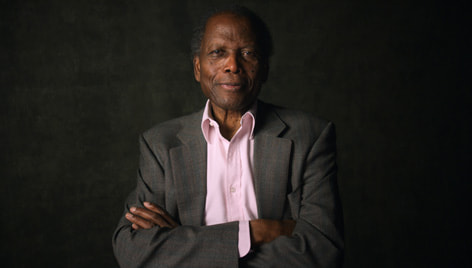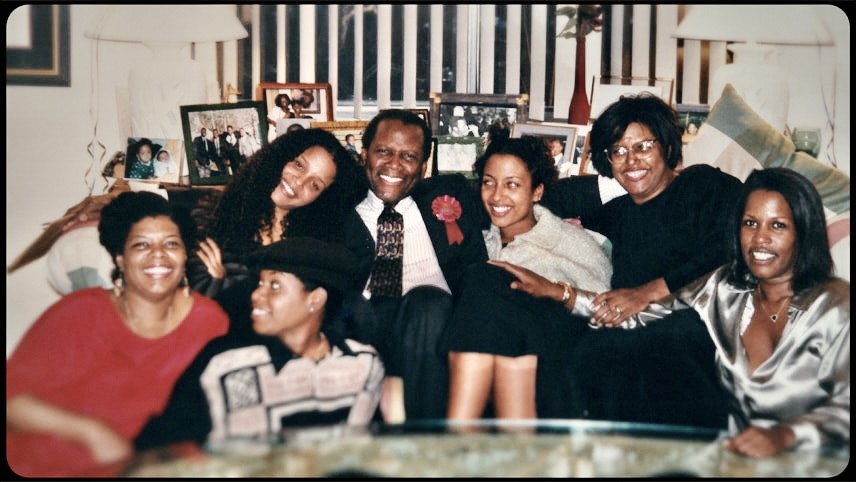Apple TV+ has recently premiered the documentary “Sidney,” and it is a must watch for those who are interested in the life story of this iconic Black actor who opened doors for many, while refusing to play subservient roles in Hollywood. Earlier this year, I wrote an extensive profile of the Bahamian-born actor after his death.
The documentary shows Poitier’s origins with him not expected to live at birth. He didn’t even consider white people or had the need to, since he lived on Cat Island. But that changed when he moved to Miami in his early teens. One of his first brushes with discrimination was as a delivery man for a department store. He had to deliver a package and he was instructed to go to the back door.

Even my mom’s house in Englewood has a memento of this era in racist history. The note on the door knocker reads, “deliver all goods in rear,” a carryover from the white folks who owned the house before us. Poitier didn’t go around to the back, but he dropped the package at the front door. When he arrived at his relative’s home, he had to leave quickly because the KKK had visited. As he wandered around with his bags contemplating his next move, local policemen threatened him at gunpoint until he walked all the way back to his home. After that time, Poitier decided to go to New York, where he looked for work that would give him a livelihood but also work that would honor his parents. He was always, according to the documentary, committed to honoring his parents for taking such good care of him.
In a 2009 interview with the Academy of Achievement, Poitier says acting came about as an accident. “I was looking for a dishwashing job in the Amsterdam News, and I saw the phrase ‘actors wanted,’ and I said I was an actor.” Poitier flubbed the reading with the American Negro Theatre and was told to go find a dishwashing job.
“He perceived me to be of no value beyond something that I could do with my hands. I was offended deeply. And I said to myself, ‘I have to rectify that.’” At one point he slept in the Greyhound bus station bathroom and was taught to read by another employee at the restaurant where he worked. He also watched a local news program to get a better grasp of English, as opposed to his Bahamian accent.
Poitier starred in nearly 20 films, before his historic role in “Lilies of the Field” and an Oscar win in 1964. The documentary reveals that the role as an itinerant handyman had first been offered to Harry Belafonte, who hated the script but marveled at Poitier’s performance.
Some of his other films were: “Blackboard Jungle,” “Porgy and Bess,” “Paris Blues,” (with Diahann Carroll) and “A Raisin in the Sun” which covered Lorraine Hansberry’s multi-generational play about Chicago’s housing discrimination.
Then came “A Patch of Blue,” where Poitier’s accountant character helps a young, blind white woman, with the film featuring the first interracial kiss, “They Call Me Mr. Tibbs!” and “Guess Who’s Coming to Dinner,” where Poitier plays a doctor considering an interracial marriage.

The 1967 “In the Heat of the Night” gave viewers a slap that could be felt across the planet. In the film, a white plantation owner slapped Poitier’s police detective character, Virgil Tibbs, and Tibbs reeled back and slapped the man as if that one slap could erase all the years of racism.
Poitier said: “[The scene] was almost not there. I said, ‘I’ll tell you what, I’ll make this movie for you if you give me your absolute guarantee when he slaps me, I slap him right back and you guarantee that it will play in every version of this movie.’ I try not to do things that are against nature.” He explained that he would be insulting every Black person if he didn’t slap the owner back. He vowed to only make movies where his character was in a position of power–and most often more powerful than any white male co-star. And with that scene, he wanted to make his parents especially proud.
Rev. Jesse Jackson told the Crusader at the time of Poitier’s death: “A victim of stereotypes, when Black men were suppressed and when we were overwhelmed by images that demeaned us, Poitier was the man for the times, uplifting and enlightening us. When he said, ‘They call me Mr. Tibbs,’ it sent a message of consciousness and hope around the world.”
The documentary covers the time when Poitier and Diahann Carroll had an affair, an affair that resulted in a divorce from his first wife. The tight relationship with fellow actor and civil rights activist Belafonte, with whom he starred in “Buck and the Preacher,” is revealed, with great footage of he and Belafonte’s social exchanges.
Upon Poitier’s death, Belafonte said: “Sidney and I laughed, cried and made as much mischief as we could. He was truly my brother and partner in trying to make this world a little better. He certainly made mine a whole lot better.”
In the early 70s, Poitier directed “Uptown Saturday Night” and “Let’s Do It Again,” and many more after that time.
Poitier received several entertainment honors, and others from the country of the Bahamas, which included a Knighthood and appointment as Ambassador to Japan. During his career, he was involved in fighting for civil rights in the United States; the importance of which could be summed up in this quote from him: “I felt as if I were representing 15, 18 million people with every move I made.”

Many celebrities and historians are included in the documentary, which was produced by Oprah Winfrey. Spike Lee, Morgan Freeman, Lou Gossett, Halle Berry, the British singer Lulu, Andrew Young, Nelson George, Poitier’s first wife Juanita Hardy, his six daughters and his widow Joanna Shimkus are also among those who made this a superb documentary.
As told by Poitier himself toward the end, “And when I die, I will not be afraid of having lived.”

Elaine Hegwood Bowen, M.S.J., is the Entertainment Editor for the Chicago Crusader. She is a National Newspaper Publishers Association ‘Entertainment Writing’ award winner, contributor to “Rust Belt Chicago” and the author of “Old School Adventures from Englewood: South Side of Chicago.” For info, Old School Adventures from Englewood—South Side of Chicago (lulu.com) or email: [email protected].
Here’s my profile from earlier this year.
To Sir, With Love and Respect for a Trailblazing Black Actor






